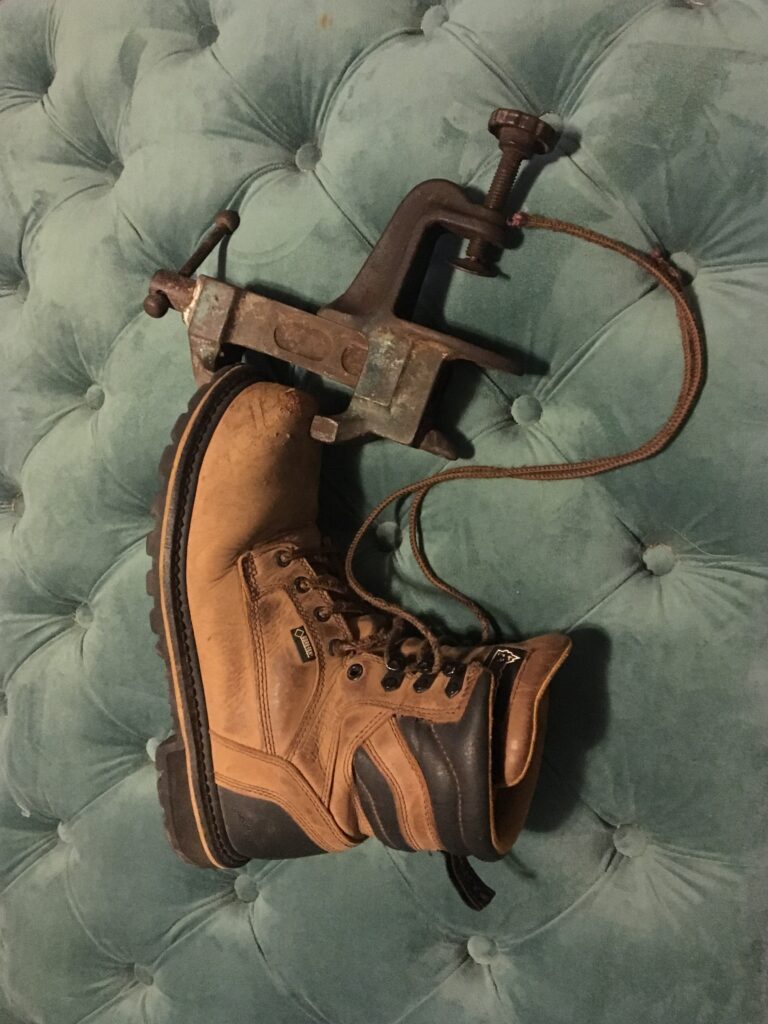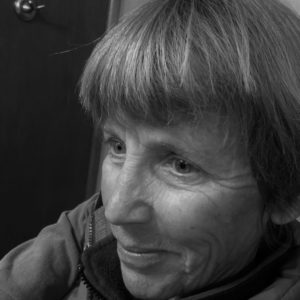
I first met Carmen twenty years ago when she lived on the corner of Third and Rose in a purple mobile home. We squeezed in at the kitchen table to study English while her three young kids came and went, hungry or cranky, needing this and that. I was a lousy English teacher, but despite my shortcomings, time did the work. We met at her kitchen table for ten years, and in that time the table changed, the purple mobile home gave way to a house on Patterson Street, the kids grew up and had their own kids. Then, after dutifully studying the Constitution, memorizing the names of the three branches of government, acquainting herself with two-and-a-half centuries of U.S. history, and passing a test I never could have passed, Carmen became a citizen.
I went to the ceremony in the courthouse and watched while five men and women, all from the same state in Mexico, raised their right hand and pledged allegiance to a country they had entered at great risk to themselves. Carmen never spoke much about her journey to America, but I did know she made more than one attempt before she succeeded. I did know she worked in a local restaurant where it was common to hurry the cooks and dishwashers out the back door as the INS officers came in the front. I did know, when she lived near Globe and became very sick for several months, and had her first child, she couldn’t seek medical help for fear of being separated from her husband and child and sent back to Mexico.
The Oath of Allegiance to the United States of America is impressive. If you’ve never read it—I hadn’t—you might take a look at it and all it requires. In language that leaves little room for uncertainty, it requires renunciation (“I absolutely and entirely renounce and abjure all allegiance and fidelity to any foreign prince, potentate, state, or sovereignty, of whom or which I have heretofore been a subject or citizen.”). It requires defense and support of the Constitution. It requires a willingness to go to war for the United States, presumably even if the war is against one’s country of origin. And somewhat mysteriously, it requires a willingness to “perform work of national importance under civilian direction when required by law.”
For most, if not all, of the men and women in Carmen’s citizenship group, the oath was not life-changing. They had been working toward this prize for years, ever since they made their way on foot across the desert that separates—and connects—this country and their country of origin. They had applied for the right papers at the right time, learned enough English to pass through the interview hurdle and the citizenship test. They had given birth and raised families and worked three jobs at a time. They had run out the back door as the INS came in the front, and now they could stop running and wake up the next day and continue performing the work of national importance they’d been doing for years. Carmen’s work of national importance was to clean houses on the weekends and clean hospital rooms all week. She’s still working at the hospital, but she’s been promoted. Now, in mask and gloves, she cleans the operating rooms—a work of national importance if there ever was one.
And yes, the oath was life-changing in one important way: It gave Carmen and her fellow new citizens the opportunity to vote. When I went to visit her last week, she and her husband Juan were sitting in their backyard in a kind of Shangri-La they’ve created. There’s a water feature, a swing and slide for the grandkids, a covered grilling area, and a pen with two chickens and a turkey. Carmen and Juan seemed happy and glad to see me. I felt the same. I did dare to ask them, both citizens, if they were going to vote in this election. They nodded and smiled and we talked about other things. Then Juan brought it up again. He said, “Margarita. This voting. It is hard to decide who we vote for.”
“Really?”
“Yes. You don’t think so?”
“No,” I said, and then I said some more, and then the day turned a little dark even though the sun was bright. I reminded myself that to understand others you have to put yourself in their shoes, but all that got me was the realization that I knew almost nothing about Juan and Carmen’s shoes. I knew about their succession of Chihuahuas, each one tinier than the one before. I knew about their children, and I’d met one of their grandchildren. I knew about their work, their many jobs, and the years when their two sons were skipping school and hanging out at the park with the wrong crowd. I sat in a church for three First Communions. I interpreted for Carmen at teachers’ meetings and on the phone with hustlers trying to sell her things she didn’t need. I met her sisters and brothers, the ones who made it to America. I’d seen photographs of her parents down in Durango, Mexico, and heard her say often how the stress in America made life too hard, how she longed to return home.
But I could not fit into the shoes she was standing in now. And that bothered me more than anything has bothered me for a long time. Maybe Juan could sense that because he said, “Don’t worry, Margarita. It is what it is. Is okay.” And then he led me over to the chicken coop and showed me how to pat the turkey. She closed her eyes and settled her feathers and seemed to like it.

